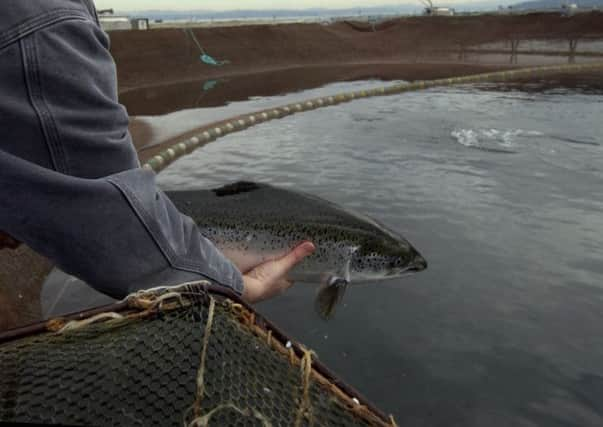Sterilise farm salmon, say experts


New research shows that while salmon reared in captivity to be eaten are genetically distinct from their wild relatives, they are just as fertile and pose a potential danger to naturally occurring populations if they escape and breed with them.
Millions of salmon escape from fish farms each year and can find their way into wild spawning groups, where they can reproduce and introduce undesirable traits.
Advertisement
Hide AdAdvertisement
Hide AdAlthough farmed salmon which have escaped are poorer breeders than their undomesticated cousins, a new study shows their sperm and eggs are just as potent and spawning behaviour may improve after a period of time roaming free. The researchers said this means they could mate with wild fish.
“Around 95 per cent of all salmon in existence are farmed, and domestication has made them very different to wild populations, each of which is locally adapted to its own river system,” according to lead researcher Professor Matt Gage, from the University of East Anglia’s school of biological sciences.
“Farmed salmon grow very fast, are aggressive and not as clever as wild salmon when it comes to dealing with predators. These domestic traits are good for producing fish for the table, but not for the stability of wild populations.
“The problem is that farmed salmon can escape each year in their millions, getting into wild spawning populations, where they can then reproduce and erode wild gene pools.”
The new report, published today, comes just days after a salmon farm in Shetland revealed 150,000 of its fish had escaped when cages were damaged by recent violent storms.
In the past ten years more than two million farmed fish, mainly of Norwegian origin, have been reported as escaped from Scottish salmon farms. It is generally accepted that many more escapes go unreported.
Scottish Government-funded research published last year by the Rivers and Fisheries Trusts of Scotland, an independent freshwater conservation charity, revealed that more than a quarter of wild salmon in the “aquaculture zone” of Scotland’s west coast are actually Norwegian hybrids. Don Staniford, director of the Global Alliance Against Industrial Aquaculture campaign group, said escaping fish would lead to an “extinction vortex” in wild salmon.
“The science is in,” he said. “Mass escapes from salmon farms are killing wild salmon. The solution is simple – stop the genetic pollution of wild salmon by removing salmon farms from our stormy seas.”
Advertisement
Hide AdAdvertisement
Hide AdScotland’s wild fisheries are worth £134 million a year and support 2,800 jobs across the country.
In January, First Minister Alex Salmon announced an independent review into improving management of the sector.
The research, published in the journal Evolutionary Applications, was funded by the Natural Environment Research Council and the Royal Society.